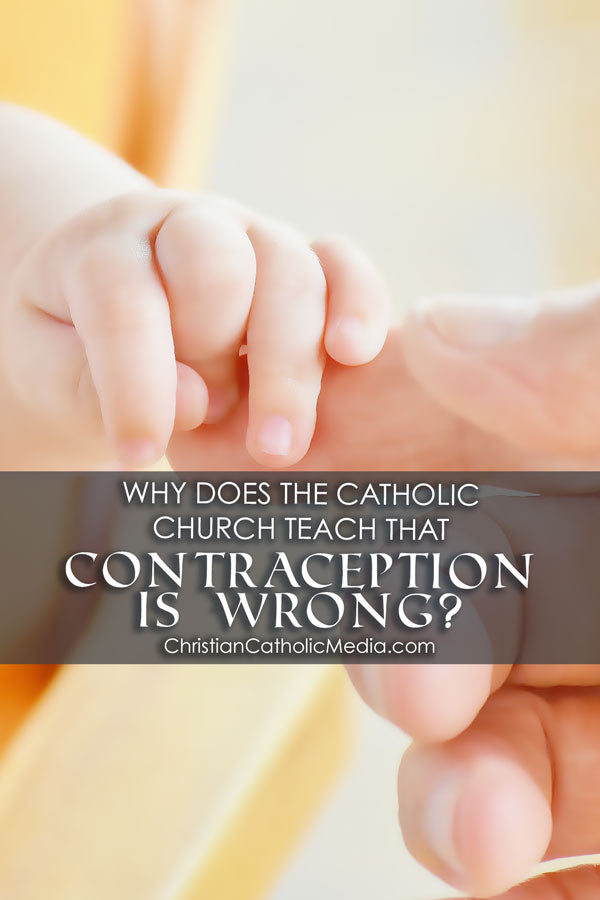
Why Does the Catholic Church Teach That Contraception Is Wrong?
The Catechism of the Catholic Church teaches that any action that blocks the transmission of life is “intrinsically evil”. You may ask, what does “intrinsically evil” mean, and doesn’t that seem harsh?
Well, in order to understand the teaching of the Church on contraception we must have a complete understanding of what it teaches about who God is and who he made us to be. This is a huge undertaking and will take more than a brief article to convey, but I am hoping to shed a glimmer of light on the topic. Furthermore, I pray that it will motivate you to seek out further the deep meaning of what the Catholic Church teaches on this matter.

Let’s start with what the Catechism says about contraception:
CCC 2370 Periodic continence, that is, the methods of birth regulation based on self-observation and the use of infertile periods, is in conformity with the objective criteria of morality. These methods respect the bodies of the spouses, encourage tenderness between them, and favor the education of an authentic freedom. In contrast, "every action which, whether in anticipation of the conjugal act, or in its accomplishment, or in the development of its natural consequences, proposes, whether as an end or as a means, to render procreation impossible" is intrinsically evil:
Thus the innate language that expresses the total reciprocal self-giving of husband and wife is overlaid, through contraception, by an objectively contradictory language, namely, that of not giving oneself totally to the other. This leads not only to a positive refusal to be open to life but also to a falsification of the inner truth of conjugal love, which is called upon to give itself in personal totality. . . . The difference, both anthropological and moral, between contraception and recourse to the rhythm of the cycle . . . involves in the final analysis two irreconcilable concepts of the human person and of human sexuality.
Some of the most profound teaching on this comes from St. John Paul II in his Theology of the Body. The Theology of the Body is a compilation of the weekly audiences that were given by then Pope John Paul II on the meaning of the human person, the body, sexuality and marriage in light of biblical revelation. In it, he speaks of contraception as purposefully blocking the nuptial meaning of the body, which is always, as St. Pope Paul the VI put it in his Humanae Vitae:
- Free
- Full (or Total)
- Faithful &
- Fruitful (Life Giving)
When we use contraception, which literally speaking means (against conception), we are purposely blocking the fruitful nature of the conjugal act and in turn we destroy all four of the essential elements of Marital Love.
Understanding Gods Revelation as LOVE
As God revealed himself through of Jesus Christ, He revealed that the Incarnation, meaning his bodily form, was essential to our salvation, or redemption, because we are incarnate beings, made in God’s image and likeness. The way this salvation, or redemption, was accomplished was through a total gift of His life, His body.
All relationships are meant to reflect the sacrificial nature of Godly love and in addition must reflect its fruitful nature. The Christian is always called to sacrificial lifegiving love. When we love others we are called to love them with action, not simply words, but Marriage is the only Sacrament where, as Jesus said the “two become one flesh” (Mark 10:8), the two bring about the one, literally the love brings a new life.
In 1 John, the apostle writes that “God is love” and that those who do not “abide in love” do not know God. This type of love is called Agape and this the type of love we are called to show one another. This is a sacrificial love and is meant to reflect who God is to the world.
In Ephesians 5:30-32 St. Paul reflects on the connection between marriage and Christ’s sacrificial love for his body, the Church.
“for we are members of his body. “For this reason, a man will leave his father and mother and be united to his wife, and the two will become one flesh.” This is a profound mystery—but I am talking about Christ and the church.”
The meaning of marriage and sex is profoundly connected to the nature of God and our relationship to Him and one another. Sex therefore has a sacramental nature and its purpose is to be both unitive and procreative. Therefore, if we supplant either of these two aspects, it no longer reflects who God is by his nature. Instead of the reflection of sacrificial love it is meant to be, it becomes self-seeking and destroys love.
The natural and spiritual final purpose of the sexual act is conception of life. Therefore, contraception is described as “intrinsically evil” because the act itself is absolutely contrary to nature, and to God himself.
Article written by Latrell Castanon for Christian Catholic Media
Latrell Castanon is a freelance writer who studied Catholic Theology at St. Joseph's College of Maine.
Do You Agree? Comment Below and Let Us Know What You Think.
